Tired of Hearing About Iraq?
I know I am. Especially because all you ever get from the media is the usual drivel about how we need to get out out fast, or how we should simply "stay the course," or how Bush is a liar and just wanted revenge against Saddam, or how we should go ahead and invade Iran, North Korea, and Venezuela. In any case, ever since it was announced that "Bush is an idiot" (a comment that apparently never gets old), all sorts of people that are almost completely ignorant of foreign affairs suddenly feel entitled to consider themselves experts on the matter and share their nonsense with anyone within earshot. If you are as tired of this as I am, I suggest you stop paying attention to these insta-experts when forming your own opinions. Try gathering some insights from those who at least have somewhat of a clue about what is going on. The pages of
Foreign Affairs magazine are a good place to start, as well as
Foreign Policy magazine and the
Foreign Policy Research Institute website (this one is highly recommended). Below is an excerpt from an article in Foreign Affairs that touches on some aspects that I constantly hear a lot of nonesense about:
Both insurgent camps know they cannot defeat the U.S.-led coalition militarily. Their best chance of success is to wait for a premature U.S. withdrawal and then spark a coup, in which a small, well-disciplined group with foreign backing seizes power from a weak, demoralized regime. Toward this end, the insurgents are fighting to perpetuate disorder and to prevent the establishment of a legitimate, democratic Iraqi government. By creating an atmosphere of intimidation, insecurity, and despair, they hope to undermine support for the government. Brazen attacks on its leaders and police send a chilling message to the Iraqi people: If the government cannot even protect its own, how can it protect you? Sabotage of Iraq's national infrastructure underscores the government's failure to provide basic services such as water and electricity and to sustain the oil production on which Iraq's welfare depends. By inflicting casualties on U.S. forces at the same time, the insurgents seek to raise the cost of continued U.S. involvement and weaken support for the war back home -- thereby hastening a U.S. withdrawal.
The insurgents have proved themselves to be resilient and resourceful, but they have also shown serious weaknesses. Compared with the United States' opponents in Vietnam, they are a relatively small and isolated group; the Iraqi rebels number no more than a few tens of thousands, whereas the ranks of the Vietnamese Communists were composed of roughly ten times that number. Iraqi insurgents rarely fight in groups as large as 100; in Vietnam, U.S. forces often encountered well-coordinated enemy formations of far greater size. The Vietnamese Communists, veterans of over two decades of nearly continuous war against the Japanese, the French, and the South Vietnamese, were also far better trained and led than the Iraqi insurgents and enjoyed external backing from China and the Soviet Union. The support provided to the insurgents by Iran, Syria, and radical Islamists elsewhere pales in comparison.
The Iraqi insurgents are also relatively isolated from the Iraqi people. Sunni Arab Muslims comprise the overwhelming majority of insurgent forces but account for only 20 percent of Iraq's population, and the jihadists are mostly foreigners. Neither insurgent movement has any chance of stimulating a broad-based uprising that involves Arab Shiites and Kurds. Indeed, despite the hardships endured by the Iraqi people, there has been nothing even approaching a mass revolt against the U.S.-led forces or the interim Iraqi government. This is not surprising, for the insurgents have no positive message with which to inspire popular support. A Baathist restoration would mean a return to the misery of Saddam's rule, and the jihadists would do to Iraq what radical Islamists have done in Afghanistan and Iran: introduce a reign of terror and repression.
The insurgency's success, accordingly, depends on continued disorder to forestall the creation of a stable, democratic Iraq and erode the coalition's willingness to persist and prevail. The insurgents believe the coalition lacks staying power, citing as evidence the U.S. withdrawals from Lebanon following the 1983 bombing of the Marine barracks in Beirut and from Somalia a decade later after 18 U.S. servicemen were killed. The Baathist insurgents hope that if they succeed in outlasting the Americans, support from Syria and other Arab states will enable them to topple the new regime. This would likely trigger a civil war, with Shiite Arab Iraqis supported by Iran. Radical Islamists would have perhaps their best chance of seizing power under such chaotic conditions.

BRAVO, a teen magazine in Germany, normally includes a poster featuring the newest pop band with its issues. This month, however, they have been distributing posters with the Holy Father's image in preparation for World Youth Day. Apparently the posters have been a tremendous success. Demand is so large that some people have even put up their own copy for sale on e-bay. It seems that there might still be hope for Germany, after all.
Factcheck.org: NARAL Falsely Accuses Supreme Court Nominee Roberts
Not finding anything real with which to accuse Supreme court Nominee John Roberts, NARAL has decided to fall back on their only option: lies. Here is what Penn's
Factcheck.org has to say about a new NARAL ad attacking Roberts:
NARAL Falsely Accuses Supreme Court Nominee Roberts
An abortion-rights group is running an attack ad accusing Supreme Court nominee John Roberts of filing legal papers "supporting . . . a convicted clinic bomber" and of having an ideology that "leads him to excuse violence against other Americans." It shows images of a bombed clinic in Birmingham, Alabama .
The ad is false.
In addition, Factcheck.org also states that:
The images used in the ad are especially misleading. The pictures are of a clinic bombing that happened nearly seven years after Roberts signed the legal brief in question.
Finally, they point out that:
In fact, Roberts called clinic bombers "criminals" who should be prosecuted fully.
It's funny. The add concludes with the words "America can't afford a Justice whose ideology leads him to excuse violence against other Americans." I would suggest that what America can't afford are extremists like NARAL "whose ideology leads them to excuse the violence of blatant lies against other Americans."

Beautiful Villa de Leiva, Boyaca.

A hostel in Raquira, a town known for its pottery and other crafts.
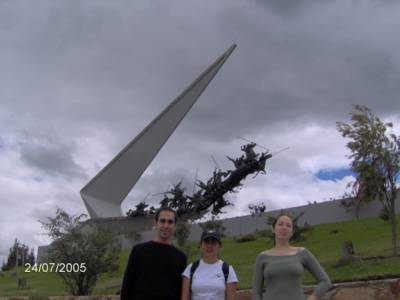
The monument by Rodrigo Arenas depicting fourteen heroic spearmen on horses at the Pantano de Vargas (Vargas's Swamp), the site of a decisive battle in the Colombian independence movement.

The gorgeous Basilica of Mongui. This is an amazing church located in a very tiny village lost in the middle of the mountains. It is amazing how the Church was able to bring such beautiful works of art and architecture to such remote places. The village as a whole is beautiful as well, though probably no bigger than it was a century ago.
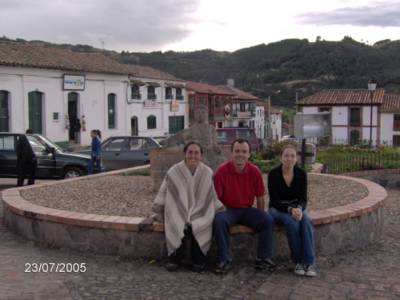
The central square at Mongui.

Altar at the Basilica of Mongui.
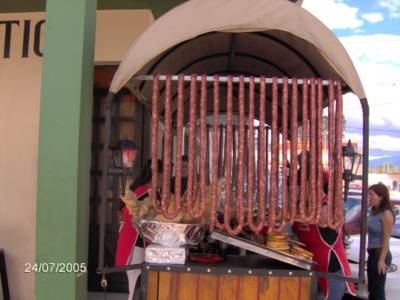
Sutamarchan, home of the best Longaniza in the country!
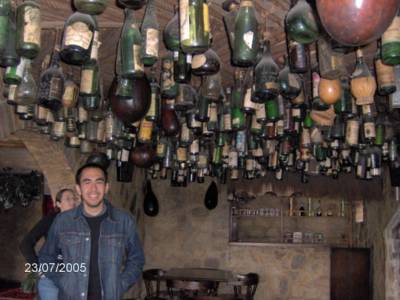
A ceiling decorated with old wine bottles at the Pozo Azul Hotel in front of the Lago de Tota.

Playa Blanca, a white-sand beach high up in the Andes!
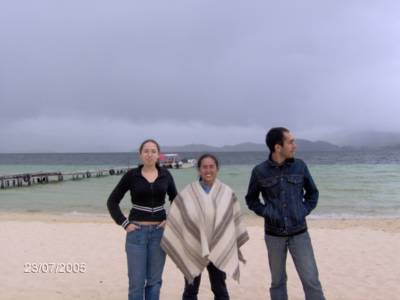
Freezing at Playa Blanca in the Lago de Tota, Boyaca.

The hostel we stayed at in Punta Larga, Boyaca.

Outside the Basilica of Our Lady of the Rosary of Chiquinquira, Patroness of Colombia.

Inside the church at Aquitania, Boyaca.
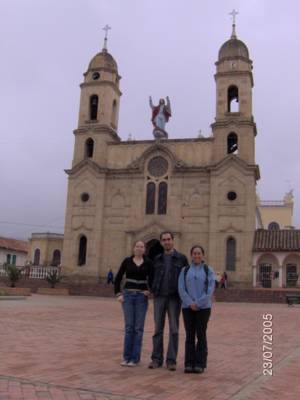
This is the church at the tiny, onion-growing village of Aquitania. Beautiful and elegant, except for the fact that someone had the bright idea of adding to it a gigantic, pastel-colored statue of Jesus on a minuscule boat (that looks like a surf-board) on top of it.

















